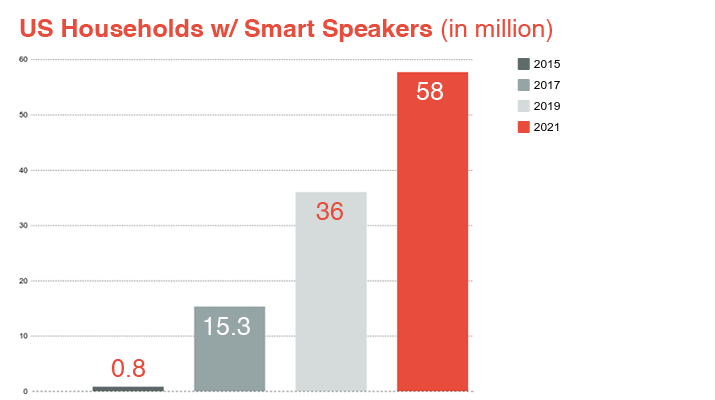So, you are into e-commerce & struggle to keep up with Amazon (which boasts the #1 app among Millennials and Centennials and made over $ 43 billion in Q3 2017)? Don’t worry, your competitors face exactly the same problems – and turn to Artificial Intelligence to solve them. Discover how using e-commerce AI solutions can help you deliver the ultimate shopping experience, reduce operating and staffing costs and boost revenue.
5 ways to use AI in e-commerce
Before we dive into the complex and fascinating world of e-commerce recommendation engines and chatbots, here are some stats to prove the new tech can be a huge value-add for retailers:
- E-commerce companies that have already put machine learning algorithms to work increase sales by 6-10% (which is two to three times higher than non-AI brands);
- On a global scale, the implementation of AI solutions in e-commerce could potentially boost the market’s profitability by 59% in 15 years;
- By 2020, 80% of customer interactions will be handled by AI algorithms.
IBM Watson commerce, Facebook/WeChat chatbots, Amazon recommendation engines and other “cognitive commerce” solutions are powered by artificial neural networks – that is, algorithms modelled on biological neural networks that process data, learn from it and make smarter decisions. The types of data you can feed to a neural network range from CRM records to your website usage stats; the intelligent algorithms classify data patterns and predict consumer behaviour and KPIs based on past events.
Sounds like science fiction, right?
There truth is, software vendors are getting pretty good at AI development, and there’s a plenty of open-source AI SDKs and libraries to bring your wildest dreams to life at a reasonable cost. Here are a few Artificial Intelligence commerce use cases for your inspiration.
Top 5 AI e-commerce use cases
- Recommendation engines. 96% of Americans prefer to shop online, citing crowds and the lack of time as the major reason behind their decision. While shopping trips are getting shorter and solitary, 57% of US customers turn to social media for shopping advice. Battling for customer attention, forward-thinking brands like Amazon (“Customers who bought this item also bought..”) and Netflix (“Other movies you may enjoy…”) use Artificial Intelligence to create personal recommendations based on a particular customer’s previous shopping/browsing activity or best-selling products. Also, AI-powered recommendation engines get smarter over time as they track suggestions a customer ignores and craft more personalized offers and keep users engaged (Amazon, for instance, automatically changes prices on half of their catalogue each day and notifies customers if products they viewed recently have been discounted). There’s a plethora of SaaS recommendation engines like Metisa, Dynamic Yield and Boomtrain that can be integrated with a Magento/Bigcommerce/Shopify store, so your dev team won’t even have to build one from scratch. Amazon has made recommendations part of nearly every phase of the buying process and increased revenue by 35%; why not give it a go, too?
- Improved targeting. We all know customer acquisition is five times more expensive than customer retention; with AI, you can learn more about your customers, identify their buying patterns and boost PPC efficiency. Amazon best deal notifications is a perfect example of how to engage (and re-engage!) consumers in a more meaningful way. With Persona Alignment API (Python-based buyer persona development tool), Twizoo (finds relevant user-generated content and displays it on your website) and Xia (Unmetric’s AI tool that helps companies increase social media engagement), you can crunch tons of search, purchase history, social media and location data to deliver the right message to the right person and at the right time – and increase conversions tenfold;

- Chatbots. Although chatbots haven’t quite lived up to the hype (some folks said bots were the end of mobile apps!), the global chatbot market is projected to reach $ 1.23 billion by 2025. The lightweight AI conversational programs that can be integrated into an e-commerce website, mobile app or messaging applications like Telegram and Facebook Messenger answer questions asked in natural language, identify keywords in customers’ replies and navigate shoppers through online catalogues. A good chatbot operates autonomously in different contexts, thus enabling e-commerce brands to save on customer support and deliver the ultimate shopping experience across all channels. Voice-based assistants like Siri and Alexa are the next step of AI commerce. The number of US households with smart speakers has already topped 15 million. 33% of Americans plan to make a voice purchase in 2018 (14% up from last year). Unless you address a reliable web/mobile app development company and optimize your store for voice search right now, you’ll be missing out on that revenue in the not-so-distant future;
- Home & warehouse replenishment solutions. By integrating AI apps (Blue Yonder) into inventory management systems, e-commerce brands can analyze customer shopping activity to balance oversupply/out-of-stock issues in the warehouse and improve customer experience. On the consumer side, there’s the LG smart refrigerator that keeps track of what food you have and (unlike Samsung’s Family Hub) allows you to order groceries through Amazon Alexa – and that’s where the future of shopping lies;
- AR shopping apps. Last but not least, there are amazing Augmented Reality shopping apps like IKEA AR, Overstock and ModiFace which solve the notorious “try before you buy” issue. Modern Augmented Reality shopping apps make use of AI algorithms to identify anatomical landmarks and apply make-up/put on virtual clothing items correctly and allow users to share enhanced pics on social media (which brings us back to the social nature of online shopping).
Once again, Artificial Intelligence is not a sci-fi concept – it is here and it works! Top e-commerce platforms including Magento (Chloe AI), Shopify (the Kit bot) and WordPress (numerous plugins like WordLift, Breinify and Darwin Pricing) help companies automate data analysis, understand customer behavior, improve ad targeting and the quality of website content and enable end users to achieve their goals with little to no human intervention. You don’t have to be a billionaire to put e-commerce AI to work! All you have to do is find a reliable vendor with a solid mobile app/web development portfolio (make sure to check our web dev services landing while you’re at it) to transform your idea into reality.
This article is reposted from here as part of the partnership between R-Style Lab and the Business Transformation Network.




